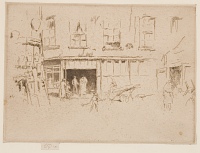Etchings Institutions search term: grolier club
Little Court | ||
| Number: | 244 | |
| Date: | 1880/1881 | |
| Medium: | etching and drypoint | |
| Size: | 127 x 176 mm | |
| Signed: | butterfly at upper right | |
| Inscribed: | no | |
| Set/Publication: | 'Second Venice Set', 1886 | |
| No. of States: | 2 | |
| Known impressions: | 22 | |
| Catalogues: | K.236; M.232; W.173 | |
| Impressions taken from this plate (22) | ||
TECHNIQUE
It was basically done in etching, with considerable shading added and reinforced in drypoint.
PRINTING
Little Court was published with A Set of Twenty-six Etchings (the 'Second Venice Set') in 1886. There are numerous dockets, receipts and lists recording the printing and delivery of the edition. Ten impressions of Little Court were delivered on 28 July, three on 20 August, eight on 6 and 21 October 1886, making a total of 29. 9
9: Whistler to W. Dowdeswell, [16 July 1887], GUW #08717.
The butterfly signature on the plate indicates a date of 1881. One impression of the first state, printed in black ink on light-weight ivory laid paper, is not trimmed or signed by the artist and might be considered a 'proof' ( ). One of the second state, printed in black ink on ivory laid paper, is trimmed to the platemark, signed on the tab with a butterfly and 'imp.' and signed on the verso with the date '24. May. 1883 -' (
). One of the second state, printed in black ink on ivory laid paper, is trimmed to the platemark, signed on the tab with a butterfly and 'imp.' and signed on the verso with the date '24. May. 1883 -' ( ). The edition of Little Court is evenly divided beween impressions of the first and second states, and nearly all are trimmed to the platemark and signed on the tab with a butterfly dating from 1886, except for one, which has a butterfly that appears to have been added by someone else, possibly one of Whistler's assistants (
). The edition of Little Court is evenly divided beween impressions of the first and second states, and nearly all are trimmed to the platemark and signed on the tab with a butterfly dating from 1886, except for one, which has a butterfly that appears to have been added by someone else, possibly one of Whistler's assistants ( ).
).
 ). One of the second state, printed in black ink on ivory laid paper, is trimmed to the platemark, signed on the tab with a butterfly and 'imp.' and signed on the verso with the date '24. May. 1883 -' (
). One of the second state, printed in black ink on ivory laid paper, is trimmed to the platemark, signed on the tab with a butterfly and 'imp.' and signed on the verso with the date '24. May. 1883 -' ( ). The edition of Little Court is evenly divided beween impressions of the first and second states, and nearly all are trimmed to the platemark and signed on the tab with a butterfly dating from 1886, except for one, which has a butterfly that appears to have been added by someone else, possibly one of Whistler's assistants (
). The edition of Little Court is evenly divided beween impressions of the first and second states, and nearly all are trimmed to the platemark and signed on the tab with a butterfly dating from 1886, except for one, which has a butterfly that appears to have been added by someone else, possibly one of Whistler's assistants ( ).
). It is possible that the first state impressions and proofs of the second state were printed by May 1883, but trimmed, signed and delivered to Dowdeswell's in July 1886, and that the second state was printed and delivered in August and October 1886. The other possibility is that the 1883 signature and inscription is actually nothing to do with the print, and just happened to be on this piece of paper, thus causing confusion!
Two impressions were printed in black ink on ivory laid paper ( ), one possibly with an Arms of Amsterdam watermark (
), one possibly with an Arms of Amsterdam watermark ( ). Most, however, were printed in dark brown ink, on a variety of papers: ivory laid paper with a coat of arms watermark (
). Most, however, were printed in dark brown ink, on a variety of papers: ivory laid paper with a coat of arms watermark ( ); off-white laid paper with a greenish tinge (
); off-white laid paper with a greenish tinge ( ); light-weight cream laid (
); light-weight cream laid ( ); cream laid watermarked 'IV' (
); cream laid watermarked 'IV' ( ); and the cancelled impressions on ivory laid paper (i.e.
); and the cancelled impressions on ivory laid paper (i.e.  ).
).
 ), one possibly with an Arms of Amsterdam watermark (
), one possibly with an Arms of Amsterdam watermark ( ). Most, however, were printed in dark brown ink, on a variety of papers: ivory laid paper with a coat of arms watermark (
). Most, however, were printed in dark brown ink, on a variety of papers: ivory laid paper with a coat of arms watermark ( ); off-white laid paper with a greenish tinge (
); off-white laid paper with a greenish tinge ( ); light-weight cream laid (
); light-weight cream laid ( ); cream laid watermarked 'IV' (
); cream laid watermarked 'IV' ( ); and the cancelled impressions on ivory laid paper (i.e.
); and the cancelled impressions on ivory laid paper (i.e.  ).
).
